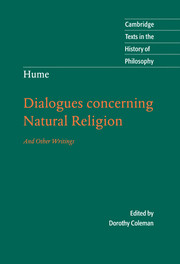Book contents
- Frontmatter
- Contents
- Acknowledgments
- Introduction
- Chronology
- Further reading
- Note on the text
- List of abbreviations
- DIALOGUES CONCERNING NATURAL RELIGION
- OTHER WRITINGS
- From Hume's memoranda
- Fragment on evil
- Letter to Francis Hutcheson, March 16, 1740 (extract)
- Letter to William Mure, June 30, 1743 (extract)
- Letters to Gilbert Elliot (extracts)
- From The Natural History of Religion
- Selections from Bayle
- Index
- Cambridge Texts in the History of Philosophy
Fragment on evil
Published online by Cambridge University Press: 05 June 2012
- Frontmatter
- Contents
- Acknowledgments
- Introduction
- Chronology
- Further reading
- Note on the text
- List of abbreviations
- DIALOGUES CONCERNING NATURAL RELIGION
- OTHER WRITINGS
- From Hume's memoranda
- Fragment on evil
- Letter to Francis Hutcheson, March 16, 1740 (extract)
- Letter to William Mure, June 30, 1743 (extract)
- Letters to Gilbert Elliot (extracts)
- From The Natural History of Religion
- Selections from Bayle
- Index
- Cambridge Texts in the History of Philosophy
Summary
Editor's note: The fragment is a remnant from a manuscript Hume was composing around the time he was completing his Treatise. It may have been late writing for the Treatise, subsequently excised, or writing for a second edition of the Treatise or some other project that was later abandoned. The first publication of the fragment, along with evidence concerning the dating of its composition, appeared only as recently as five years before the start of the twenty-first century. See M. A. Stewart, “Hume's Early Fragment on Evil,” in John Wright and M. A. Stewart, eds., Hume and Hume's Connexions (University Park, PA: Pennsylvania State University Press, 1995), Ch. 8.
Sect. 7
Fourth objection
The fourth objection is not leveled against the intelligence of the deity, but against his moral attributes, which are equally essential to the system of theism.
The attempt to prove the moral attributes from the natural, benevolence from intelligence, must appear vain, when we consider that these qualities are totally distinct and separate. Reason and virtue are not the same; nor do they appear to have any immediate connection, in the nature of things. Even in man, any degree of the one affords no presumption for an equal degree of the other. A sound understanding and a hard heart are very compatible. Allowing, therefore, the intelligence of the deity to be proved by phenomena, ever so clear and decisive; we can draw no inference concerning his benevolence, without a new set of phenomena, equally clear and decisive.
- Type
- Chapter
- Information
- Hume: Dialogues Concerning Natural ReligionAnd Other Writings, pp. 109 - 112Publisher: Cambridge University PressPrint publication year: 2007

